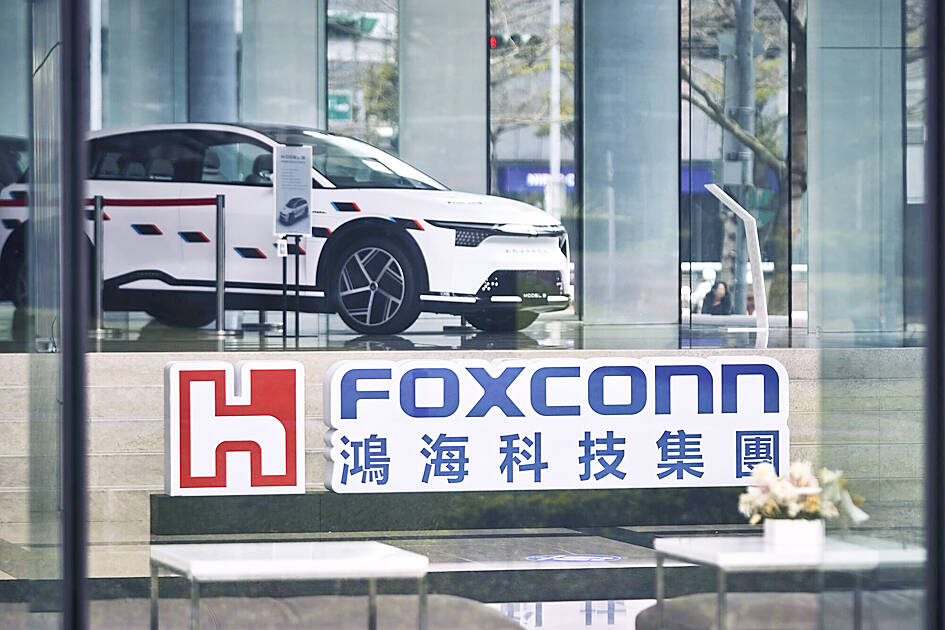Yulon Motor Co (裕隆汽車) yesterday said it is to manufacture electric vehicles (EVs) in Taiwan for Japan’s Mitsubishi Motors Corp based on a model developed by Foxtron Vehicle Technologies Co (鴻華先進), its joint venture with Hon Hai Precision Industry Co (鴻海精密).
Earlier in the day, Foxtron Vehicle signed a memorandum of understanding with Mitsubishi Motors to provide contract design and manufacturing services for an EV model.
The deal is the first EV order for Hon Hai, which has made inroads into the business over the past six years. The iPhone maker, also known internationally as Foxconn Technology Group (富士康科技集團), had previously approached Nissan Motor Co, Mitsubishi’s largest shareholder, to further its EV ambitions, but to no avail.

Photo: Bloomberg
The first EV model to be supplied to Mitsubishi Motors is expected to become available in Australia and New Zealand from the second half of next year, Foxtron Vehicle said in a statement.
In a separate statement, Mitsubishi Motors said the two sides would proceed with further discussions for the cooperation toward a definitive agreement.
The collaboration is part of a product plan announced last year highlighting “excellent driving performance as an EV and an advanced infotainment system, making it optimal for the Oceania region,” Mitsubishi Motors said.
Foxtron Vehicle and Mitsubishi Motors gave no financial details.
Foxtron Vehicle lists on its Web site 11 vehicle models, including its Model T bus, Model V pickup truck, Model N van, Model B hatchback and its “luxury flagship” Model E sedan.
Yulon would produce the vehicles for Mitsubishi Motors at the company’s plant in Miaoli County’s Sanyi Township (三義), it said.
“That opens a new opportunity for Taiwanese automakers to tap into overseas markets,” Yulon added.
The company has been assembling vehicles for Nissan Motor Corp and Mitsubishi Motors on a contract basis for a long time. At the Sanyi factory, it has cranked out more than 10,000 EVs, including the n7 model for its subsidiary Luxgen Motor Co (納智捷汽車). The n7 is based on the first EV model designed by Foxtron.
Yulon said it is setting up a new production line at the Sanyi factory to produce new EVs based on the Foxtron-developed Model B for the domestic and overseas markets.
The Sanyi factory has an installed capacity of 5,500 vehicles per month, with potential output to reach 11,000 units per month if it uses double shifts.
Additional reporting by CNA

AGING: As of last month, people aged 65 or older accounted for 20.06 percent of the total population and the number of couples who got married fell by 18,685 from 2024 Taiwan has surpassed South Korea as the country least willing to have children, with an annual crude birthrate of 4.62 per 1,000 people, Ministry of the Interior data showed yesterday. The nation was previously ranked the second-lowest country in terms of total fertility rate, or the average number of children a woman has in her lifetime. However, South Korea’s fertility rate began to recover from 2023, with total fertility rate rising from 0.72 and estimated to reach 0.82 to 0.85 by last year, and the crude birthrate projected at 6.7 per 1,000 people. Japan’s crude birthrate was projected to fall below six,

US President Donald Trump in an interview with the New York Times published on Thursday said that “it’s up to” Chinese President Xi Jinping (習近平) what China does on Taiwan, but that he would be “very unhappy” with a change in the “status quo.” “He [Xi] considers it to be a part of China, and that’s up to him what he’s going to be doing, but I’ve expressed to him that I would be very unhappy if he did that, and I don’t think he’ll do that. I hope he doesn’t do that,” Trump said. Trump made the comments in the context

SELF-DEFENSE: Tokyo has accelerated its spending goal and its defense minister said the nation needs to discuss whether it should develop nuclear-powered submarines China is ramping up objections to what it sees as Japan’s desire to acquire nuclear weapons, despite Tokyo’s longstanding renunciation of such arms, deepening another fissure in the two neighbors’ increasingly tense ties. In what appears to be a concerted effort, China’s foreign and defense ministries issued statements on Thursday condemning alleged remilitarism efforts by Tokyo. The remarks came as two of the country’s top think tanks jointly issued a 29-page report framing actions by “right-wing forces” in Japan as posing a “serious threat” to world peace. While that report did not define “right-wing forces,” the Chinese Ministry of Foreign Affairs was

PREPAREDNESS: Given the difficulty of importing ammunition during wartime, the Ministry of National Defense said it would prioritize ‘coproduction’ partnerships A newly formed unit of the Marine Corps tasked with land-based security operations has recently replaced its aging, domestically produced rifles with more advanced, US-made M4A1 rifles, a source said yesterday. The unnamed source familiar with the matter said the First Security Battalion of the Marine Corps’ Air Defense and Base Guard Group has replaced its older T65K2 rifles, which have been in service since the late 1980s, with the newly received M4A1s. The source did not say exactly when the upgrade took place or how many M4A1s were issued to the battalion. The confirmation came after Chinese-language media reported